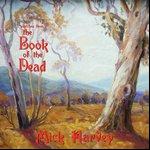
Mick Harvey Sketches from the Book of the Dead
(Mute)
Mick Harvey needs little introduction, but for those who are unfamiliar: He was one of the founding members of the Boys Next Door, The Birthday Party and Nick Cave & The Bad Seeds up until his departure in 2009. You’ll also catch him currently on tour with PJ Harvey after he co-produced the NR 10/10 album, Let England Shake. This is the first studio album entirely of his own material, and the title is a literal account of what the album is, a series of sketches of the dead, people Mick Has lost over the years. While that explanation may conjure up some rather sombre, miserable images, instead the album leans towards being more reflective than resigned. Mick’s voice has a rich, velvety baritone tonality to it, one that almost evokes a softer, more fragile Johnny Cash. One of Mick’s essential qualities in the Bad Seeds was his ability to create something distinctive from something ubiquitous, something individual from something simple and primitive, his use of acoustic guitar was a prime example of this – just look at a song such as Papa Won’t Leave You Henry, the strings ring out bold and sharp in a way that only Mick can make them. This quality has been extended to this record and it feels like a natural extension of Mick’s character. The album is very much his own, the only song that resembles anything like a Bad Seeds number is arguably Two Paintings, which has a fragile piano running through it, reminiscent of the plaintive and gorgeous ballads of The Boatman’s Call.
The concept the album takes on is not a portrayal nor an accurate embodiment of characters that have died; Harvey is exploring fragments of memories and associations with them, generally the things you only attribute to the dead once they have gone. The album has a traditional, almost folk-telling aspect to it; you very much feel like you are being sat down on Mick’s knee and being told a tale or two in front of a roaring fire. It is stripped bare of anything deemed superfluous, so the accompaniments rarely stretch beyond guitar, bass, piano, strings and drums. The result, however, is not of a vacant sound, but a sparse yet sonically rich set of arrangements that are used sparingly yet effectively. Mick’s job towards the later years in the Bad Seeds was often associated with being an arranger and his work in soundtracks seeps through too, creating a sense of depth, texture and humble atmosphere; ultimately, it feels like the work a man who has complete control over this album and knows what is needed and when. The primary question that you are left asking is why it’s taken a man with so much talent so long to release a record consisting entirely of his own material? Fortunately there is enough worth and intrigue within this record to keep you occupied until the next one, if there is one.
11 May, 2011 - 08:55 — Daniel Dylan Wray